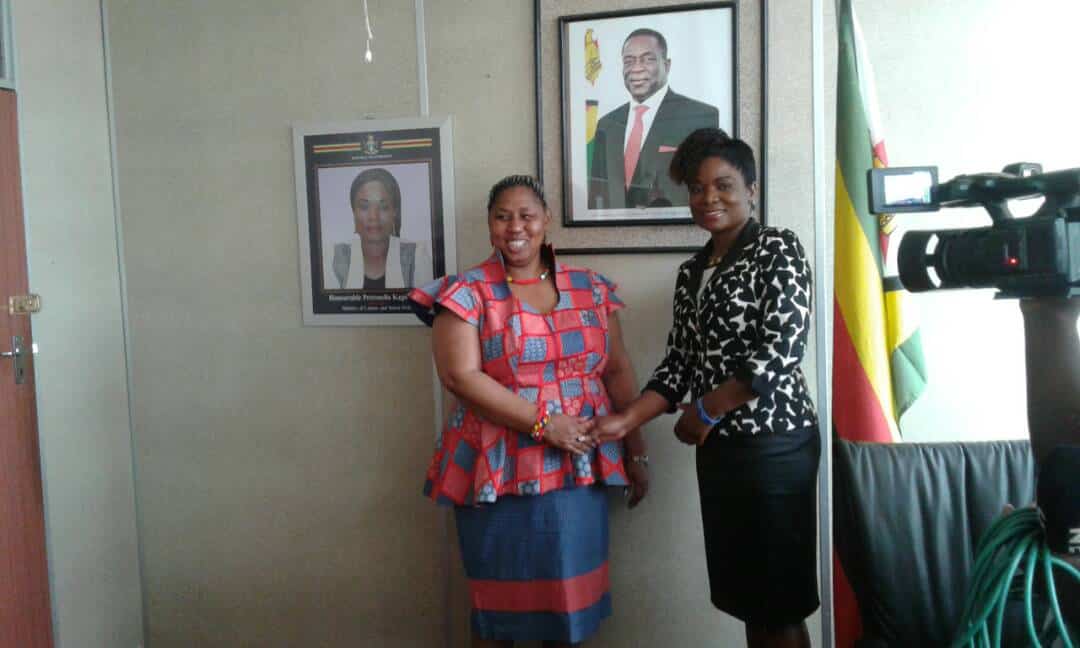The Governments of Zimbabwe and South Africa are committed to ensuring efficient service delivery for people with disabilities (PWDs). For this reason, the South African Deputy Minister for Social Development, Hendrietta Bogopane-Zulu visited the country to discuss with the minister of Labour and Social Welfare, Petronella Kagonye.
The bilateral visit was to guarantee comprehensive expansion of rights of PWDs. In regard to the Convention on the rights of PWDs, the government of Zimbabwe guarantees the elimination of hindrances to their full partaking in daily life through provisions that assure the right to self-reliance, family life, protection from abuse, access to functional treatment and special facilities where needs arises.
Speaking during the courtesy call on the 12th of March 2018 in Harare, Minister Kagonye said the visit was quite important as it was enhancing the cooperation that already existed between the two countries.
She said service delivery in the key social service for PWDs remains the capitalisation of programmes and projects aimed at advancing their rights. Zimbabwe, Kagonye said, prides itself in being one of the first African countries to transmit disability-friendly and explicit statutes.
“We have a comprehensive legislative framework that offers social protection to PWDs grounded within the context of rights based approaches. This legal framework provides for direct Parliamentary allocation of financial resources into the disabled Persons Fund established especially for the maintenance of PWDs’” Kagonye said.
She added that it was the ministry’s responsibility to make sure there were provision of effective and efficient public service delivery to all and enhancement of social protection programmes for vulnerable groups through ZimASSET.
“My ministry participates in the Social Services and Poverty Eradication cluster, which is one of the four results-based strategic clusters of ZimASSET namely Food Security and Nutrition Social Services and Poverty Eradication, Infrastructure and Utilities and Value Addition and Beneficiation.”
Minister Kagonye said that providing opportunities for persons with disabilities was critical to the development of the nation and she recognised the support that is being received from the civil society.
“The critical social change task of providing welfare and rehabilitation to PWDs cannot be holistic through government efforts alone. I acknowledge the role played by civil society as represented by Disabled Persons Organisations in their advisory capacity to all Government initiatives,” she said.
Kagonye pointed out that empowering PWDs was the key to get out of dependence and become self-sufficient.
The ministry carried out consultations towards the alignment of the Disabled Persons Act to the Constitution. The government decided to carry out a wholesale alignment having over the years dealt with incorporation of developments in the disability field through policies and programming.
Bogopane-Zulu indicated that the visit was an assessment of South Africa and the government of Japan where they agreed to partner with other Southern Development Countries (SADC) countries to be able to facilitate the empowerment of PWDs.
“This is the first assessment of six countries which includes Zimbabwe, Botswana, South Africa, Lesotho, Namibia, Mozambique and Swaziland. As SADC countries, we want to ensure that we come together so that Heads of States meet, they will be able to share recommendations in the area of disability,” Bogopane-Zulu said.
The assessment is done under the backdrop of the African Union approval. She reiterated that her government sought to inquire knowledge from Zimbabwe in as much as empowerment of PWDs was concerned.
“Our aim to join with the Zimbabwean Government is to learn from what Zimbabwe does when catering for these people. Zimbabwe also learns from us. The assessment can also help financially. When we prepare the budget we would be able to understand the Zimbabwean minister’s vision or whenever she wants to change the disability portfolio,” she said.






